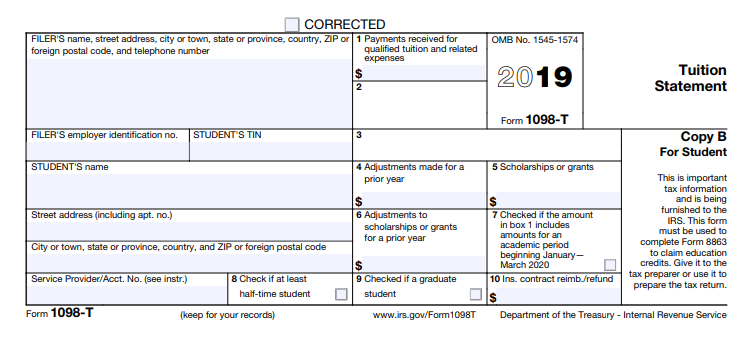In our guide to education tax deduction and student loan tax deduction tips, you can learn more about the conditions of this education tax deduction for student loan interest. For example, the student loan interest tax deduction can be claimed as an income adjustment, and you do not need to itemize your tax deductions to qualify for the tax credit.
In addition, by claiming this education tax deduction, a taxpayer may write off the interest paid on student loans and other types of credits, like revolving credit lines (for example, credit cards used to pay qualified educational expenses). In some cases, including amounts from scholarships or grants as income, thus increasing qualified education expenses eligible for credit, provides more of a tax benefit than does not include scholarships or grants in the income.
The tax credit amount is 20% of the first $10,000 spent for qualified education expenses or up to $2,000 per tax return. The credit may be stacked for multiple students at a home who are attending college simultaneously. For example, a taxpayer with a modified adjusted gross income of $80,000 ($160,000 or less for joint filers) may claim a credit for qualified expenses for one qualified student. Single filers who have adjusted gross incomes of $80,000 to $90,000 may take the credits, as may joint filers who have adjusted gross incomes between $160,000 and $180,000. You can get up to $2,500 in credit annually for each student, 100% of the first $2,000 in qualified expenses, plus 25% of expenses over $2,000.
Let’s dive into the details.

Who Should Claim an Education Tax Deduction, the Parent or the Student?
If you are a college student and no one claims you as a dependent, you can claim the credit. But if you are the parent of a college student you claim as a dependent, you will take the tax credit for yourself.
Whoever claims the credit will need a Form 1098-T from the school that shows how much was paid for tuition and qualified expenses. If you don’t have a 1098-T, you can always request one, but not all schools are required to provide them. If your institution doesn’t send you a 1098-T, you will still need an enrollment record and what was paid for tuition and expenses.
How can I claim an Education Tax Deduction?
If you’re looking to file your taxes and claim your education tax credit, PriorTax is the way to go. Our Online Tax program will guide you through all the necessary steps for claiming your credit, and if you’re a college student filing a simple return, you may even qualify for free filing. In addition, with PriorTax, there’s no need to worry about leaving out important details like your education credits or the student loan interest deduction – we’ll make sure everything is accounted for.
Can I claim American Opportunity Tax Credit?
If you are a college student, the American Opportunity Tax Credit (AOTC) can help you offset the cost of tuition and related expenses. The AOTC is a tax credit worth up to $2,500 per year for an eligible college student. It is refundable up to $1,000, meaning you can get money back even if you don’t owe any taxes. You can claim this credit a maximum of four times. So if you are facing rising tuition costs, be sure to take advantage of this valuable tax credit.
How Can claim the AOTC?
There are several requirements that a college student must meet in order to qualify for the AOTC tax credit. First, the student must be enrolled in an eligible educational institution and pursuing a degree or other recognized education credential. The student must also be enrolled in eligible institutions at least half-time for an academic period during the tax year. Additionally, the student cannot have finished the first four years of college at the beginning of the tax year and cannot have already claimed the AOTC on four prior tax returns. Finally, the student cannot have a felony drug conviction at the end of the tax year.
Note that there is an income threshold for the AOTC. To receive the full amount of credit, you need your modified adjusted gross income (MAGI) to be below $80,000 or $160,000 when married filing jointly. If your MAGI is more than $80,000, you get a reduced amount; if it is more than $90,000, you cannot claim the credit.
How can I claim Lifetime Learning Credit?
Nonrefundable credits of up to $2,000 a year are available for qualifying students. You may take the credit yourself if nobody claims you as a dependent. You may claim this credit an unlimited number of times.
The lifetime learning credit is up to $2,000 per year per qualifying student. In addition, there is no limit on how many years you may take advantage of the credit, and no minimum number of courses must be taken in order to be eligible for the Lifetime Learning Credit. In other words, you do not have to enroll in classes full-time to be eligible.
If you are a college student and nobody claims you as a dependent, you are free to file a return and claim that credit. If you are a parent of a student who is claimed as a dependent, you may take this credit on your individual income tax return.
What is Student Loan Interest Tax Deduction?
The Student Loan Interest Deduction allows you to deduct up to $2,500 in student loan interest from your taxes. If you paid $600 or more in interest on your student loans during the tax year, you should receive a Student Loan Interest Statement (Form 1098-E) from your lender. You can claim this deduction in addition to one of the other education credits or deductions for which you may be eligible.
How Much Can I Tax Deduct for Student Loan Interest?
The student loan interest deduction can be a great way to save money on your taxes. If you meet all these requirements, you may be able to deduct up to $2,500 in interest paid on your student loans. The tax deduction can be taken in addition to an education tax credit, so it’s definitely worth looking into if you’re a college student or parent paying for college. Reach out to our Tax Experts to learn more about the student loan interest tax deduction and how it can benefit you
What Education Expenses Qualify for a Tax Deduction?
A few additional education tax credits are available, each with its requirements. The American Opportunity Tax Credit allows you to claim expenses such as tuition, fees, books, supplies, and other necessary equipment for your course of study. Other qualifying credits include the Lifetime Learning Credit and the tuition and fees deduction.
To qualify for any of these credits, the expenses must be paid for educational purposes only – room and board, insurance, health fees, transportation, and living expenses do not count. Additionally, income limits may affect your eligibility for certain credits.




